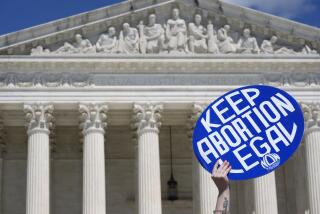Report Finds Satisfaction with Double Mastectomy
- Share via
Most women at high risk for breast cancer who chose to have both healthy breasts removed in the hope of averting the disease are satisfied with their decision, according to a survey released Wednesday.
Nearly three-fourths of the women were satisfied with their sexual relationships after the surgery. More than two-thirds said the surgery either did not affect or had a favorable effect on their feelings of femininity. Satisfaction levels did not fluctuate with the age of the women. The average age at surgery was 42, and an average of 14.2 years had passed since surgery when the study was conducted.
The study, published in Wednesday’s issue of the Journal of the American Medical Assn., confirms results presented at last year’s meeting of the American Society of Clinical Oncology.
These results could help women at high risk make the difficult decision on whether to have their breasts removed, said Marlene Frost, a public health researcher who led the study at the Mayo Clinic in Rochester, Minn.
“This study provides women with some objective information based on what other women have experienced,” Frost said.
Preventive double mastectomy can reduce the likelihood of breast cancer by 90% among women with a family history of the disease, according to a previous study by the same researchers. Yet only about one in nine women who express an interest in preventive mastectomy actually proceeds with the surgery.
The study polled 572 of the 639 women who underwent preventive double mastectomy from 1960 to 1993 at the Mayo Clinic. All the women had a family history of breast cancer.
Despite the overall satisfaction rate, most women reported some form of emotional or physical hardship following the surgery. Eighteen percent reported a drop in self-esteem, and 36% reported diminished satisfaction with their body appearance.
Of the women who were dissatisfied, most named reasons such as adverse symptoms following surgery, problems with implants, body image, and insufficient information or support.
The positive results need to be interpreted carefully, said Timothy Rebbeck, an epidemiologist at the University of Pennsylvania. “What you worry might happen is that women who are at low risk might be more favorably disposed toward having the surgery when they are really not good candidates for such a radical treatment,” said Rebbeck.






